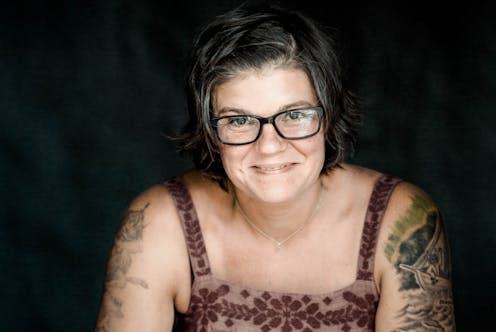Maid author Stephanie Land reveals the ‘constant, crushing’ panic of her hungriest year, but this college memoir is ‘emptier’
- Written by Amber Gwynne, Associate Lecturer in Writing, The University of Queensland

It’s 2014, her senior year of college. Stephanie Land, bestselling author of Maid[1], is almost 35, still two years away from landing the publishing deal that will change her life.
A single parent of a six-year-old, she gulps coffee from an empty peanut-butter jar in college classes and struggles to stay awake after kindergarten drop-off. Before the year is out, she’ll be pregnant again, her circumstances infinitely harder.
Land’s mind is always somewhere else. Rent. Bills. Groceries. Medicine, if the budget will stretch that far. An abusive ex-partner who’s stingy with child support.
“It’s pretty relentless”, a college professor remarks dismissively in the feedback on one of Land’s life-writing assignments, a quibble that “throbs” in the aspiring author’s head for days afterwards.
My life may be relentless, she later writes in one of her many notebooks, but goddammit so am I.
So the days and weeks unfold in Land’s second memoir, Class[2], an insular but vivid reflection on a tertiary education system that seems to sabotage the very students who work hardest to be there.
Review: Class – Stephanie Land (Atria)
“Of all the things in my life that I didn’t have access to or felt like I didn’t deserve for some reason, an education hadn’t crossed my mind as a thing I wasn’t supposed to have,” Land recalls.
Yet getting an English degree while struggling to put food on the table leaves Land frequently wracked with guilt, a “constant, crushing panic”.
Pressing towards graduation, often on the brink of physical exhaustion, she reflects bitterly on the administrative hoop-jumping required of students with little financial or social support, striking at the corporatised core of higher education in America:
I had forgotten the part of the game where no one’s education mattered more than the money the university could make from your opportunity to soak up all that learning. God forbid they would make it affordable or easy.
The years she spends in snowy Missoula, Montana, are not just plagued by hunger in the literal sense. They are propelled by it too. She hankers for the respite of an easier life: financial security, reliable child care and possible entry to an MFA program.what’s an MFA?
















